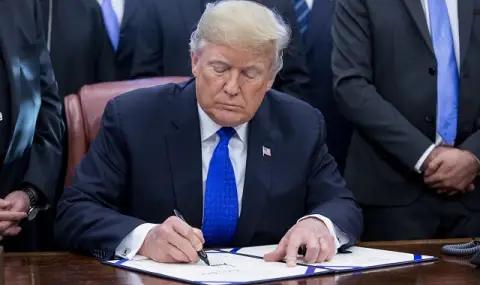New higher tariffs on goods from Canada, Mexico and China from day one. Trump threatened with this step, and according to analysts, it could have a heavy impact on Europe, which is also threatened by a trade war with the United States.
Will this be the start of a global trade war? Donald Trump has threatened to impose new higher tariffs on goods from Canada, Mexico and China on his first day in the White House. Economists warn that this could be the beginning of a trade war that will affect Europe as well. The intentions of the incoming US administration call for tariffs of 25 percent on all goods from Canada and Mexico, and for China, the current rate will be increased by an additional ten percent.
Why does Trump want to raise tariffs?
Trump sees the tariffs as a source of income to fill the state coffers, ZDF notes. The German public-law media clarifies that in this way he could finance at least part of the planned tax cuts for companies. Trump's intentions envisage a reduction of the corporate tax rate from 21 to 15 percent.
German media recall that he wanted to deal with the chronic trade deficit through tariffs during his first term from 2017 to 2021, because the US traditionally imports more than it exports. Last year the imbalance reached $773 billion.
The peculiarity is that the duties will be paid by those American companies that order goods from abroad, not by the exporters. I.e. in the end, much of the bill will be footed by consumers. "Imported goods will become more expensive, inflation will rise, which will burden budget revenues," says economist Thomas Gitzel, quoted by ZDF.
There is one more thing - if inflation rises, the Central Bank will not be able to loosen its interest policy. It cut key interest rates for the first time in years in September, which was followed by a second such move in November. They are currently between 4.50 and 4.75 percent. Investors are predicting that the rate cut will end in the middle of next year and the prime rate will shrink to between 3.75 and 4.
What does this mean for the euro?
If US interest rates remain higher, the dollar will be more attractive to investors - it has appreciated significantly since Trump's re-election, and one euro is now worth less than $1.05, after being at the beginning of November 1.09.
There are also predictions that the dollar may soon become more expensive than the euro. And since many goods on world markets are traded in dollars, this will make imports more expensive and increase inflation in the Eurozone. Tariffs on Europe could lead to a recession, but there is also the danger of an avalanche of Chinese imports.
And if Trump introduces new tariffs for Europe as well?
In the words of economist Carsten Brezisky, quoted by ZDF, if higher US tariffs are also introduced for EU products, this will have a negative impact and could lead the German economy into recession.
If the 10 percent increase is introduced for European goods as well, German exports to the US could drop by 15 percent in the medium term, Moritz Schularik, chairman of the Kiel Institute for World Economics, told ZDF. The US is the largest importer of goods from Germany - in 2023 worth 157.9 billion euros, which corresponds to 9.9 percent of the total amount.
But it may even come to the point that Germany will be flooded with Chinese goods if their manufacturers withdraw from the US due to the increase in tariffs. "In this situation, exporters from China, but also from other countries, can redirect their goods to Europe," economist Vincent Stammer told ZDF. This, in turn, could lead to a reduction in inflation in the Eurozone, but only if the EU, in turn, does not decide to raise tariffs on American or Chinese goods.
Economist Holger Schmieding, in turn, points out that the trade war can be avoided if a deal is made with Trump. "If on some issues Europe inclines - for example to increase military spending and purchases of weapons and liquefied gas from the US, a trade war can be avoided."
